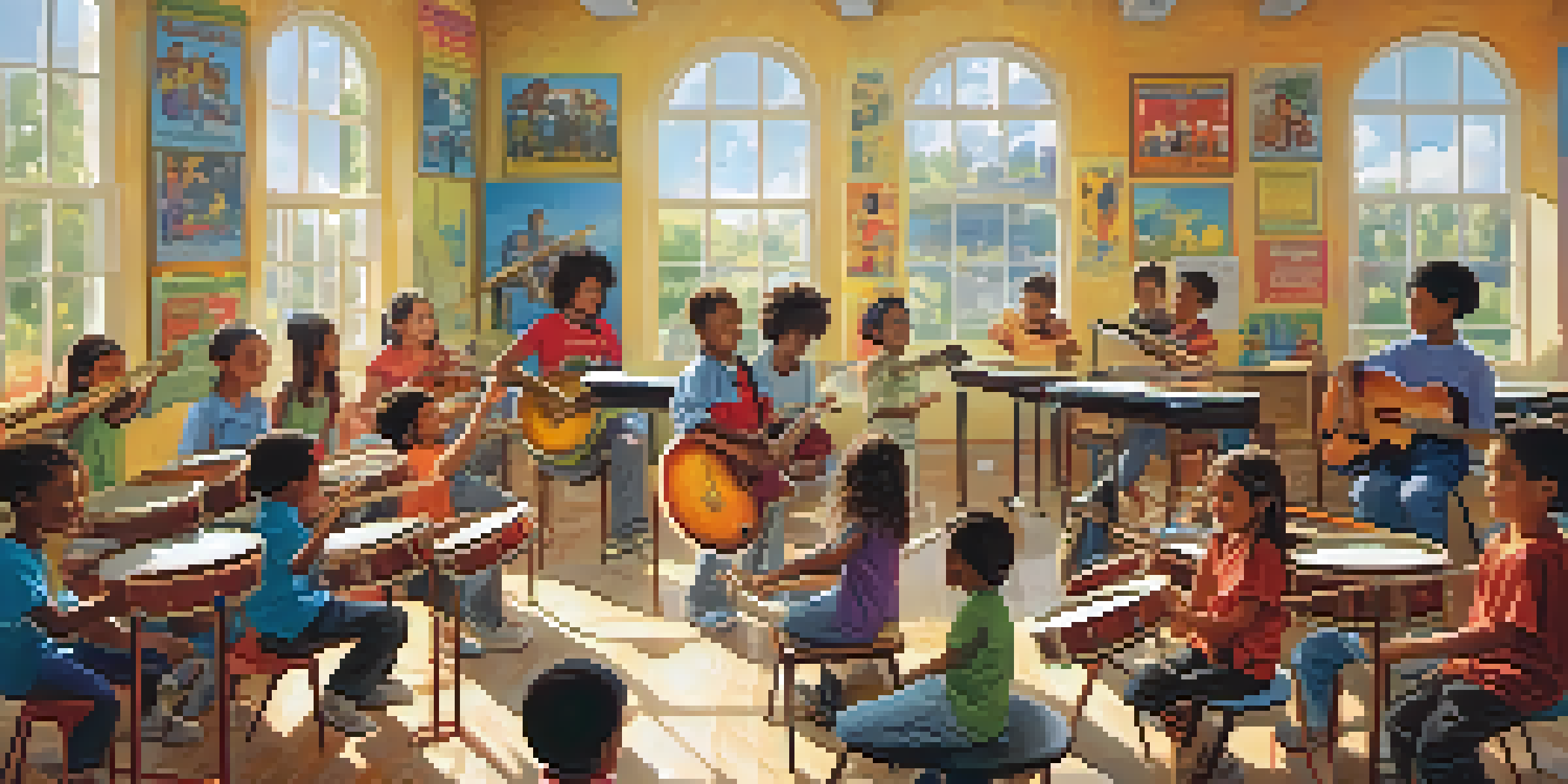Music and Its Effects on Children’s Health and Development

Music as a Tool for Emotional Expression in Children
Music provides children with a unique way to express their emotions. Through singing, dancing, or playing instruments, they can convey feelings that might be difficult to articulate in words. This form of expression can help them process their experiences and build emotional intelligence.
Music can change the world because it can change people.
For example, a child who feels anxious might find comfort in listening to calming music, which can act as a soothing balm. This not only helps them manage their emotions but also encourages them to explore different musical genres that resonate with their feelings, fostering a deeper connection to music.
Additionally, sharing music with friends or family can strengthen bonds and create shared experiences, making emotional expression a collective journey. As children navigate their emotional landscapes, music serves as a reliable companion.
Enhancing Cognitive Development Through Music
Research shows that engaging with music can significantly boost cognitive skills in children. Learning to play an instrument or understanding rhythms and melodies can enhance memory, attention, and even language development. These skills are crucial as they form the foundation for academic success.

For instance, a study found that children who took music lessons scored higher on standardized tests compared to their peers. This connection highlights how music education can be a fun and effective way to sharpen cognitive abilities while also sparking creativity.
Music Enhances Emotional Expression
Music provides children with a unique outlet to express and process their emotions, fostering deeper emotional intelligence.
Moreover, the act of creating music—whether through songwriting or improvisation—encourages critical thinking. Children learn to problem-solve and think outside the box, making music not just an art form but a valuable educational tool.
Social Skills Development Through Group Music Activities
Participating in group music activities, like choirs or bands, can help children develop essential social skills. These settings require collaboration, communication, and teamwork, all of which are vital for building healthy relationships. Children learn to listen to one another while also expressing their own ideas.
Where words fail, music speaks.
For example, in a school band, each musician must work together to create a harmonious sound. This cooperation teaches patience and understanding, as they must adjust their playing to complement others. The result is not just beautiful music, but also lasting friendships.
Additionally, these social interactions can boost a child's confidence. Performing in front of an audience, for instance, encourages them to overcome fears and embrace their individuality, fostering a strong sense of self-worth.
Music's Role in Physical Health and Motor Skills
Engaging with music can also have positive effects on children's physical health. Dancing to music or playing instruments can improve coordination, balance, and fine motor skills. These physical activities contribute to overall fitness and can encourage a more active lifestyle.
Consider how children naturally respond to music; they often can't help but dance! This spontaneous movement not only brings joy but also promotes physical activity, which is essential for their health. Activities like drumming can further enhance coordination by requiring precise hand movements.
Boosting Cognitive Skills with Music
Engaging with music significantly enhances children's cognitive development, improving skills like memory, attention, and creativity.
Moreover, learning an instrument involves a lot of physical engagement, such as finger placements and breath control. These actions can lead to improvements in muscle strength and control, ultimately benefiting a child's physical development.
The Therapeutic Benefits of Music for Children
Music therapy has emerged as a powerful tool for supporting children's mental health. It provides a safe space for children to express themselves, process trauma, and cope with anxiety or depression. Many therapists use music as a medium to facilitate communication and healing.
For instance, children with autism may find it easier to connect with others through music rather than direct conversation. This can lead to improved social interactions and emotional understanding, making music therapy a vital resource for these children.
Additionally, music can serve as a calming influence, helping children manage stress and improve focus. Whether it's through listening to soothing melodies or participating in guided music therapy sessions, the therapeutic benefits of music are profound and far-reaching.
Cultural Awareness and Diversity Through Music
Music is a universal language that introduces children to diverse cultures and experiences. By exploring different musical styles from around the world, children gain insight into various traditions, histories, and values. This exposure fosters an appreciation for diversity and encourages open-mindedness.
For example, learning about and participating in world music can spark curiosity about different cultures. Children might be inspired to explore traditional dances or instruments, promoting cultural exchange and understanding.
Music Builds Social Connections
Group music activities promote essential social skills, encouraging collaboration and boosting children's confidence through shared experiences.
Moreover, music can serve as a bridge for conversations about social issues and community. By discussing the themes and stories behind different songs, children develop critical thinking skills and empathy towards others, enriching their worldview.
Fostering Lifelong Love for Music in Children
Encouraging children to engage with music from an early age can cultivate a lifelong passion. Whether through formal lessons, informal jam sessions at home, or simply listening to music together, these experiences can create lasting memories. This foundation can lead to a deep appreciation for music throughout their lives.
For instance, a child who enjoys playing the piano may continue to explore their musical interests as they grow older, potentially leading to advanced studies or even a career in music. The joy of creating or experiencing music can become a cherished part of their identity.

Additionally, fostering this love for music can encourage families to bond over shared experiences, whether it's attending concerts or simply enjoying a favorite playlist together. Music, in this way, becomes a thread that weaves through the fabric of family life.